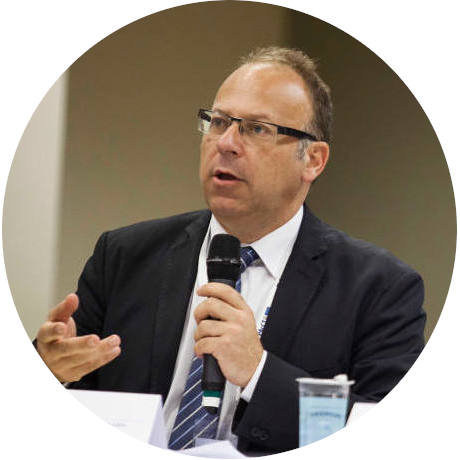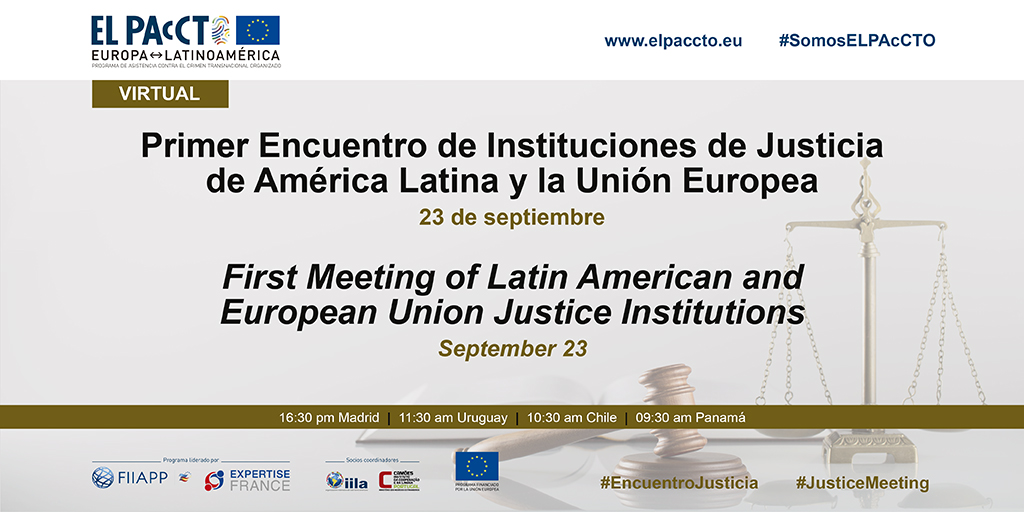-
|
15 October 2020
|Posteado en : Opinion
Antonio Roma, prosecutor and coordinator of EL PAcCTO’s cooperation between justice systems component, analyses the keys to the need for cooperation between legal entities in Europe and Latin America to combat organised crime, improve security and promote socio-economic development.
The intensity of legal relations between Europe and Latin America is forever increasing and their efficient functioning is key to combating organised crime on both sides of the Atlantic. This is a crucial issue in achieving the general and legal security of the countries, in addition to facilitating their social and economic development. There are now systems for coordination between institutions in the different states, however, we are at a key moment to further strengthen their consolidation.
The regulatory and institutional reality reveals an increase in the working tools available to all of the states’ legal operators, from the territorial units in the Public Prosecutor’s Offices to bodies that cover national jurisdictions. As a consequence, there has been a quantitative and, more importantly, a qualitative increase in requests for cooperation between different national authorities. In addition, following community-based models, more sophisticated cooperation instruments are being implemented on both continents. This is the case in the creation of joint investigation teams and the rules facilitating the execution of transnational warrants for the arrest of suspects and for the protection of witnesses. However, in order that these mechanisms exist and that results are obtained, coordination systems are necessary.
Professional networks are an essential mechanism and extremely practical. Furthermore, there is a need, indeed a great need, for inter-agency coordination systems. The European Union has its own bodies, that carry out their own functions in relation to the crimes committed in its different states, as is the case with the recently created European Public Prosecutor’s Office, or that facilitate coordination between national legal authorities, frequently public prosecutors’ offices, as is the case for Eurojust.
Between Latin America and several European states there are institutions going back some years that in recent times have made progress with regard results. These include the Conference of Ministers of Justice of the Ibero-American Countries (COMJIB), the Ibero-American Judicial Summit (CJI) and the Ibero-American Association of Public Prosecutor’s Offices (AIAMP). All of them facilitate the relationships between the different groups they contain and they have established foundations for their work over the coming years.
Fighting organised crime requires greater effort in coordination and cooperation. Personal and legal protection, as well as economic and social development, means not exhausting efforts exclusively in the operation of assistance systems between the different legal operators. In a globalised world, it is not enough to apply systems that do not extend beyond state or even continental borders, especially with the economic, cultural and family flow that exists between Latin America and the European Union, especially its southern states.
Coordination between the community and national institutions of the Latin American states has begun, but it is not enough. In today’s interdependent world, cooperation is imperative to meet common challenges. Our knowledge and our actions complement and reinforce each other. The efficient functioning of the fight against organised crime in pursuit of greater legal protection and economic and social development requires support through more effective cooperation formulas that go beyond strictly legal aspects. And this is now more important than ever.

Antonio Roma Valdés
Prosecutor and coordinator of EL PAcCTO’s cooperation between justice systems component
More information:
EL PAcCTO is a European Union-funded programme managed by FIIAPP and Expertise France with its partners IILA and Camôes. The objectives for the Cooperation Between Justice Systems component led by FIIAPP include promoting cooperation and coordination between institutions in Latin America and Europe. This was the reason behind it organising the 1st Encounter Between the Justice Institutions of the EU and Latin America, on 23rd September, to promote cooperation and legal coordination, as well as increased efficiency in the fight against organised crime.
 High-level representatives took part in this encounter, including the Spanish Minister of Justice and members of COMJIB, AIAMP, the International Judicial Summit, Eurojust and the Council of Europe, as well as the European Commission Directorate General for International Cooperation and Development (DEVCO).
High-level representatives took part in this encounter, including the Spanish Minister of Justice and members of COMJIB, AIAMP, the International Judicial Summit, Eurojust and the Council of Europe, as well as the European Commission Directorate General for International Cooperation and Development (DEVCO). -
|
20 May 2015
|Posteado en : Reportage
In the week when the OECD is presenting its report on the economic progress of Latin America, we bring you the reality of Argentina thanks to EUROsociAL.
The European Union cooperation programme for Latin America, EUROsociAL, focuses its work on social cohesion and development in various Latin American countries. One of them is Argentina, where work is being done on several projects for access to justice and prevention of violence in collaboration with the Ministry of Justice.
Kids in the “Jóvenes con más y mejor trabajo” [Young People With More and Better Jobs] programme of the Access to Justice Centre of Santiago del Estero mounted a campaign against institutional violence. Among their actions, the mural created with the slogan of the campaign, “No me pongas la mano encima” [Don’t lay a hand on me], an “open-mike radio show” and a street performance stand out.
Street violence
The IDLO, the international organisation that supports justice, (with the collaboration of EUROsociAL), held a workshop in Santiago del Estero Province to train young people on how to create their own campaigns to raise awareness about rights, and there was almost no debate: “institutional violence”—and in particular the mistreatment young people experience at the hands of the police—would have to be at the centre of their actions.
According to the IDLO, in Argentina, kids going about their business on the streets know that being detained, chased and possibly arrested by a police patrol on its rounds is a real possibility.
In most cases, there is no real motive for this. The most habitual pretext is “having the face of a criminal” or “looking suspicious”—their appearance is what makes them suspicious. Wearing a track suit or a baseball cap is an aggravating factor. One minute you’re talking to your friends, and the next you’re up against the wall with your things scattered on the pavement and a pair of hands frisking you looking for weapons or drugs.
Since 2013, EUROsociAL has been consolidating various tools for access to justice policies oriented towards different vulnerable groups: besides the young protagonists of this story, it has championed migrant women’s right to justice in Costa Rica, women victims of violence in Honduras, women victims of human trafficking in Chile, the indigenous population in Peru, and African-descended young people in Brazil”.




